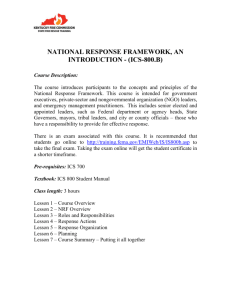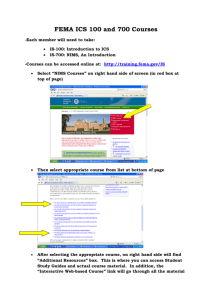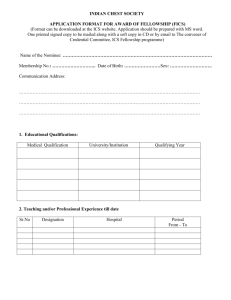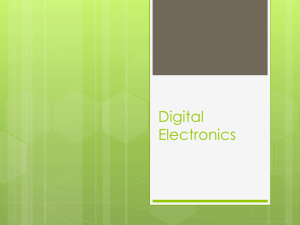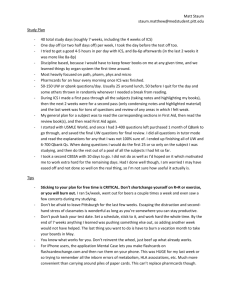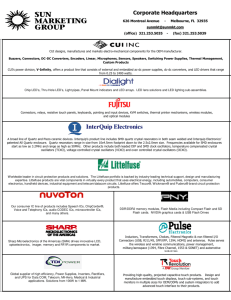Industrial Control Systems Course Descriptions ICS 1103: PROGRAMMING I
advertisement
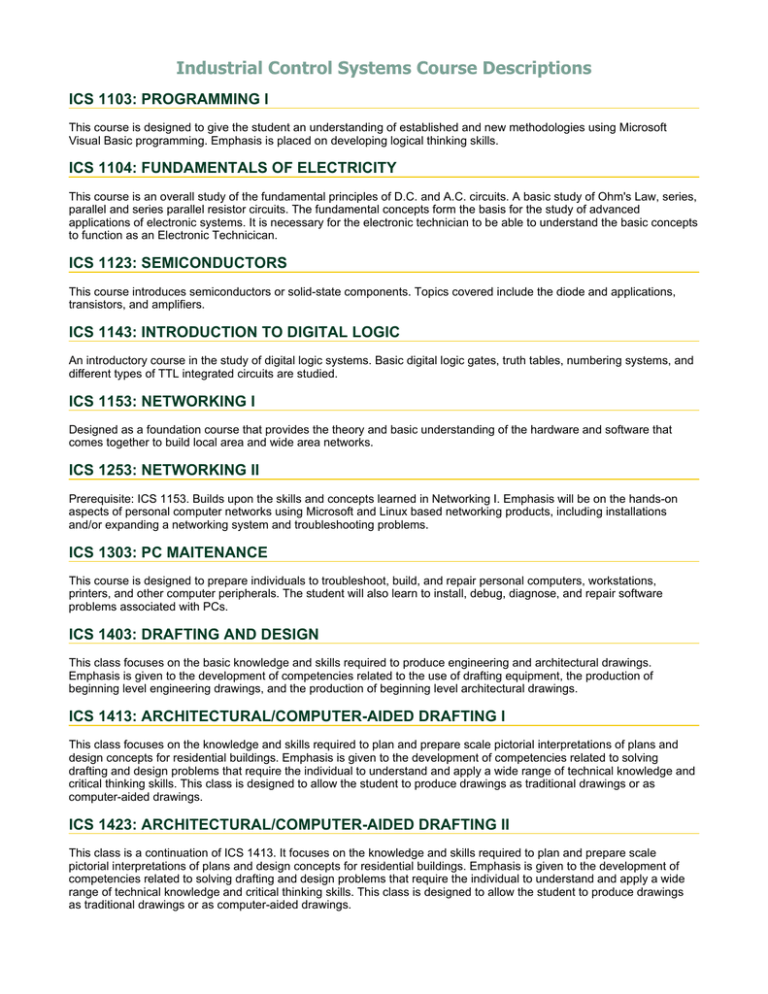
Industrial Control Systems Course Descriptions ICS 1103: PROGRAMMING I This course is designed to give the student an understanding of established and new methodologies using Microsoft Visual Basic programming. Emphasis is placed on developing logical thinking skills. ICS 1104: FUNDAMENTALS OF ELECTRICITY This course is an overall study of the fundamental principles of D.C. and A.C. circuits. A basic study of Ohm's Law, series, parallel and series parallel resistor circuits. The fundamental concepts form the basis for the study of advanced applications of electronic systems. It is necessary for the electronic technician to be able to understand the basic concepts to function as an Electronic Technicican. ICS 1123: SEMICONDUCTORS This course introduces semiconductors or solid-state components. Topics covered include the diode and applications, transistors, and amplifiers. ICS 1143: INTRODUCTION TO DIGITAL LOGIC An introductory course in the study of digital logic systems. Basic digital logic gates, truth tables, numbering systems, and different types of TTL integrated circuits are studied. ICS 1153: NETWORKING I Designed as a foundation course that provides the theory and basic understanding of the hardware and software that comes together to build local area and wide area networks. ICS 1253: NETWORKING II Prerequisite: ICS 1153. Builds upon the skills and concepts learned in Networking I. Emphasis will be on the hands-on aspects of personal computer networks using Microsoft and Linux based networking products, including installations and/or expanding a networking system and troubleshooting problems. ICS 1303: PC MAITENANCE This course is designed to prepare individuals to troubleshoot, build, and repair personal computers, workstations, printers, and other computer peripherals. The student will also learn to install, debug, diagnose, and repair software problems associated with PCs. ICS 1403: DRAFTING AND DESIGN This class focuses on the basic knowledge and skills required to produce engineering and architectural drawings. Emphasis is given to the development of competencies related to the use of drafting equipment, the production of beginning level engineering drawings, and the production of beginning level architectural drawings. ICS 1413: ARCHITECTURAL/COMPUTER-AIDED DRAFTING I This class focuses on the knowledge and skills required to plan and prepare scale pictorial interpretations of plans and design concepts for residential buildings. Emphasis is given to the development of competencies related to solving drafting and design problems that require the individual to understand and apply a wide range of technical knowledge and critical thinking skills. This class is designed to allow the student to produce drawings as traditional drawings or as computer-aided drawings. ICS 1423: ARCHITECTURAL/COMPUTER-AIDED DRAFTING II This class is a continuation of ICS 1413. It focuses on the knowledge and skills required to plan and prepare scale pictorial interpretations of plans and design concepts for residential buildings. Emphasis is given to the development of competencies related to solving drafting and design problems that require the individual to understand and apply a wide range of technical knowledge and critical thinking skills. This class is designed to allow the student to produce drawings as traditional drawings or as computer-aided drawings. ICS 1433: ENGINEERING/COMPUTER-AIDED DRAFTING I This class focuses on the knowledge and skills required to produce advanced level engineering drawings. Emphasis is given to the development of competencies related to solving drafting and design problems that reqire the individual to understand and apply a wide range of technical knowledge and critical-thinking skills. This class is designed to allow the student to produce drawings as traditional drawings or as computer-aided drawings. ICS 1443: ENGINEERING/COMPUTER-AIDED DRAFTING II This class is a continuation of ICS 1433. It focuses on the knowledge and skills required to produce advanced level engineering drawings. Emphasis is given to the development of competencies related to solving drafting and design problems that reqire the individual to understand and apply a wide range of technical knowledge and critical-thinking skills. This class is designed to allow the student to produce drawings as traditional drawings or as computer-aided drawings. ICS 2115: PROGRAMMABLE CONTROLLERS Deals with the subject of programmable controllers (PCs). The PC is a microprocessor-based programmable device used in controlling mechanical machinery, energy management systems, computer integrated manufacturing, and other applications. Lecture: 3 hours, laboratory: 6 hours. This course is designated as "Green". ICS 2116: BASICS OF INDUSTRIAL AUTOMATION An illustrated study of circuit configurations used in industry. Topics to be covered are: solid-state systems used to control D.C. and A.C. motors, electro-mechanical devices, three-phase power, open and closed loop motor control, robotic input and output transducers, various instrumentation and process control classes. Lecture: 9 hours, laboratory: 5 hours. This course is designated as "Green". ICS 2123: INDUSTRIAL FLUID POWER This course is designed to provide the basic knowledge and application of physical principles involving pumps, cylinders, valves, motors, design, assembly, graphic symbols, and the operation of hydraulic and pneumatic control circuits based on logic principles. Lecture: 4 hours, laboratory: 1 hour. ICS 2203: COMPUTER SYSTEM COMPONENTS A study of the internal structure of the microprocessor. The full computer system is analyzed from both aspects of hardware and software. Many of the principles studied apply to computer troubleshooting and computer interfacing. Many of the computer support circuits are studied. Many of the skills learned from Programming I, Operating Systems, and Digital Logic are brought together and enhanced. This course is designated as "Green". ICS 2213: SEMICONDUCTORS II A continuation of ICS 1123, this course is a study of field effect transistors, thristors, and linear integrated circuits. ICS 2303: PC MAINTENANCE II Prerequisite: ICS/CIS 1303. This course is designed to teach individuals core elements of computer repair based on the A+ Certification exams. The student will build on the knowledge acquired from PC Maintenance I, allowing them to be more prepared to diagnose, and repair computers in the working environment. ICS 2413: NATURAL GAS PRODUCTION, DISTRIBUTION, AND MANGAMENT SYSTEM A study of producing, distributing, and managing natural gas; overview of drilling, finishing wellheads, natural gas compression, separtation, metering, gas sampling, data gather and reporting are covered, safety is emphasized. Lecture: 3 hours ICS 2423: ELECTRICAL POWER GENERATION, TRANSMISSION, AND DISTRIBUTION SYSTEMS A study of generating, transmitting and distributing electrical power; types of electrical generation, methods of transmission both overhead and underground, transformer configurations, switching and metering are covered, safety is emphasized. Lecture: 3 semester hours ICS 2433: OCCUPATIONAL SAFETY TRAINING This course is designed to fulfill the requiremetns of the OSHA 40 hour certification; health, safety and environmental requiremetns and regulations, as well as personal protective equipment pertaining to energy management are emphasized. Lecture: 3 hours ICS 2443: DATA ACQUISITION SYSTEMS FOR ENERGY MANAGEMENT Students will obtain knowledge required to specify, evaluate, and use a wide variety of data acquisition systems in laboratory and field applications. Basic principles of sampling and digitizing are presented and reinforced with practical examples from everyday testing operations. Lecture: 3 hours. ICS 2991,2992,2993,2994,2995,2996: SPECIAL TOPICS FOR INDUSTRIAL CONTROL SYSTEMS This course is designed to introduce students to specific areas in Industrial Control Systems. Course content and credit are designed to meet the needs of the student. The topic will vary from offering to offering; thus, the course may be taken more than once for a total of 6 hours. This course requires 15 clock hours per one semester credit hour.
